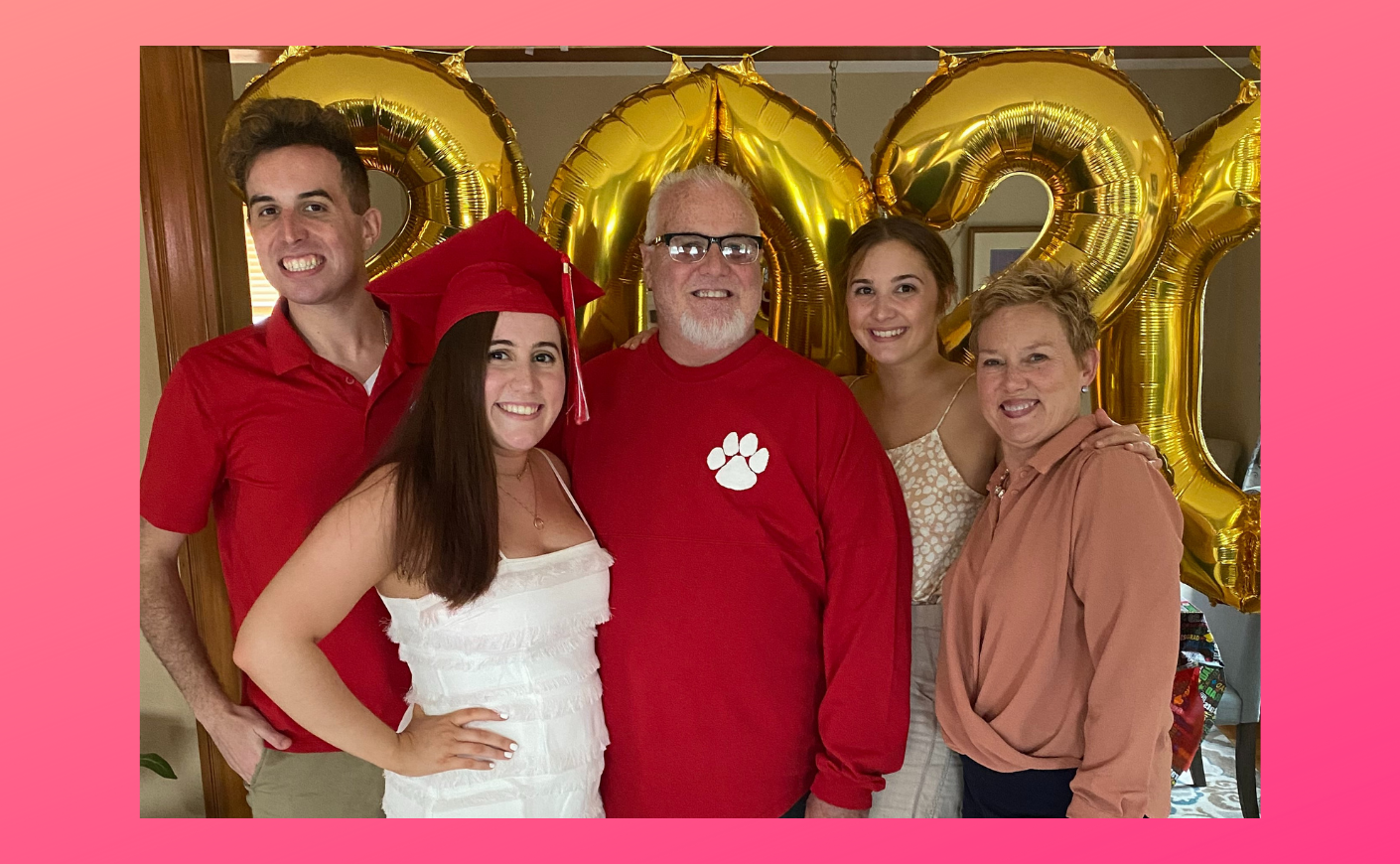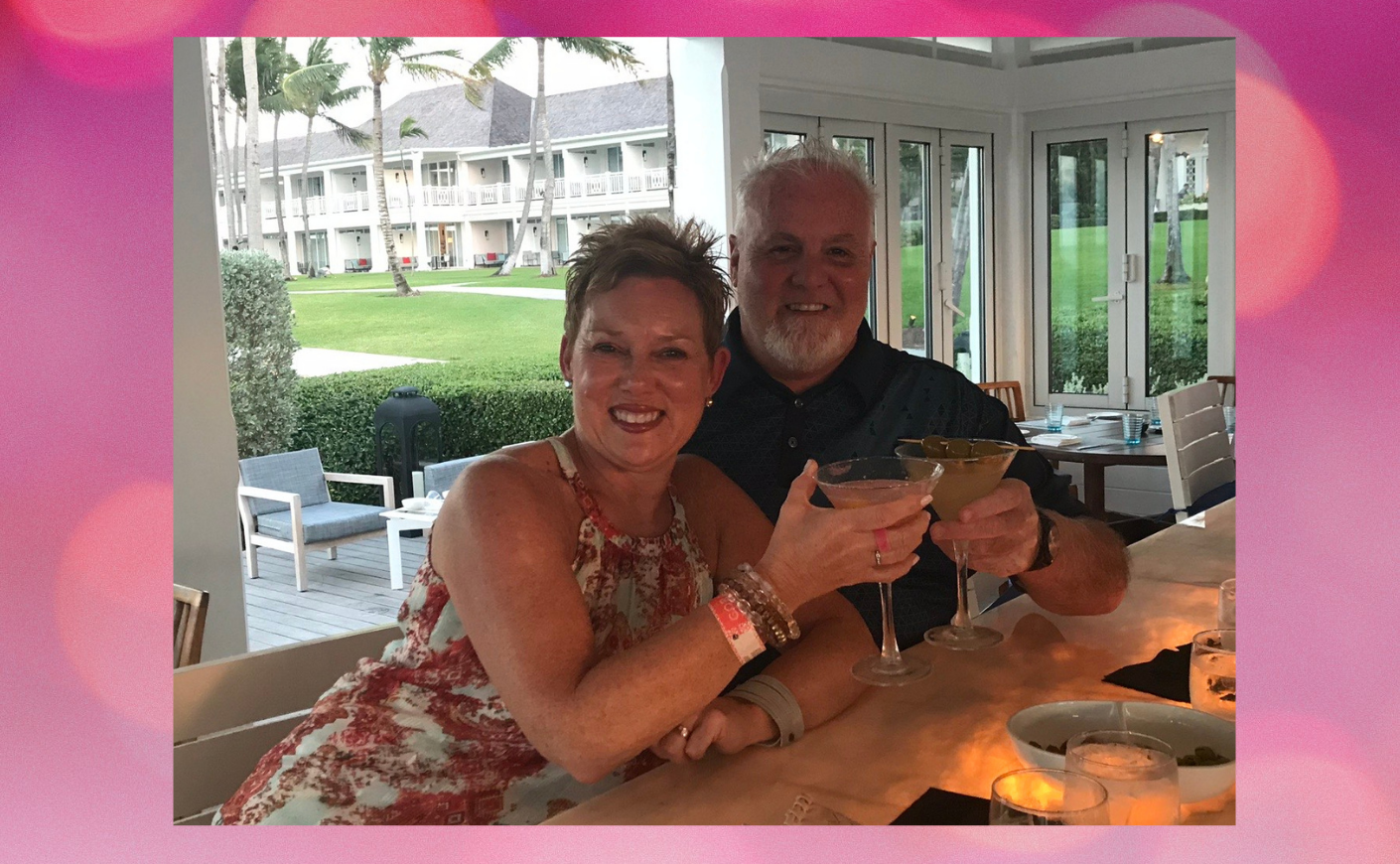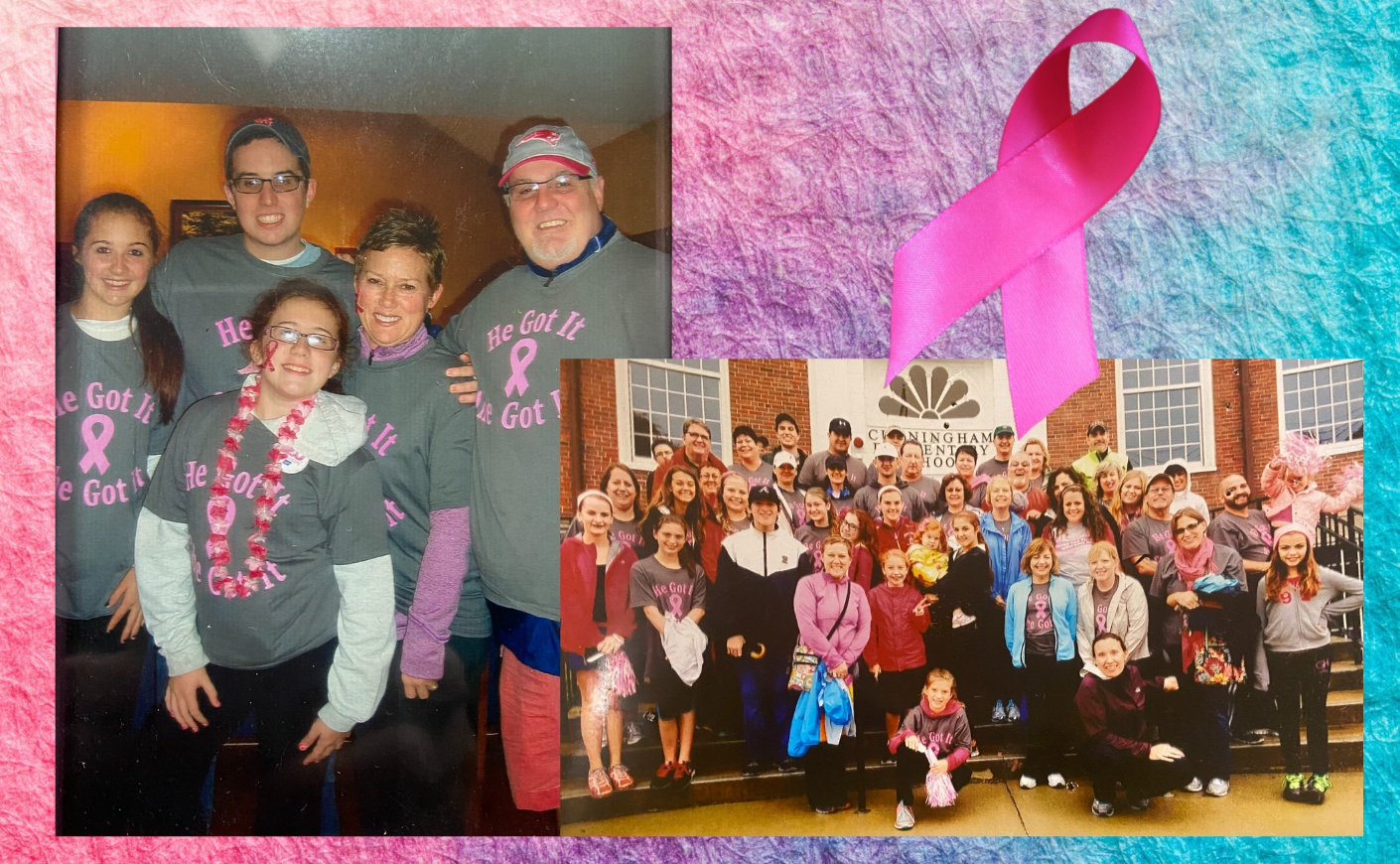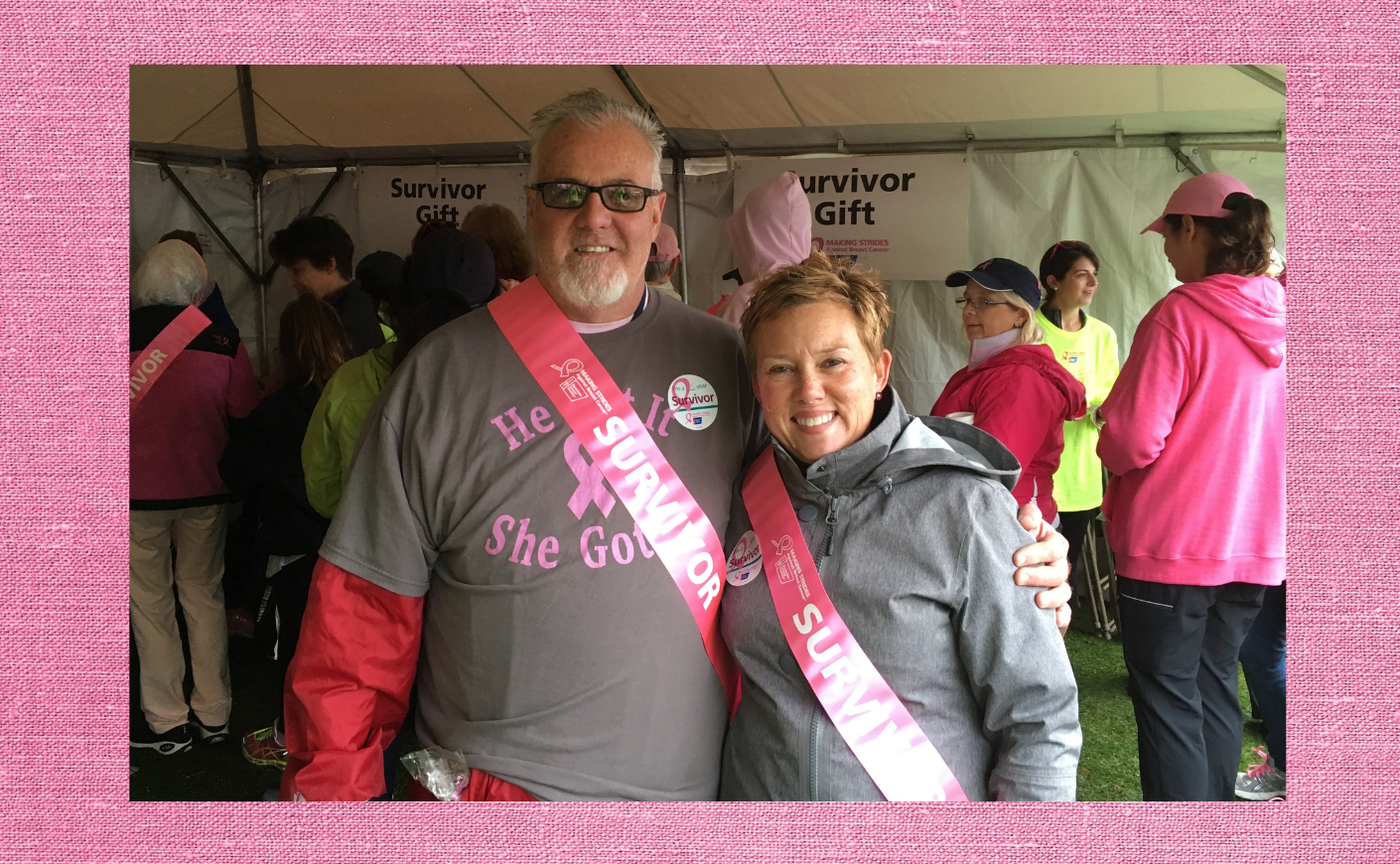As you might expect for a couple who’s been married for more than 30 years, Annellen and Rusty Lydon have a lot in common.
They both grew up in South Boston, they’re both devoted parents to their three children, and they both love to tell a good story. (“We’re talkers — I just want to let you know,” Annellen warns as they jump on the phone with KCM.) But their most remarkable similarity is especially surprising. Not only did they each have a battle with a life-threatening disease, but they both dealt with the exact same one: breast cancer.
Cancer is always a shock, and it’s even worse when it strikes the same couple twice. For the Lydons, it happened 10 years apart; Rusty’s diagnosis came in 2001, followed by Annellen’s in 2011. Both were painful and frightening, but they were particularly baffled by Rusty’s illness, and not just because he was first. He was also the only man either of them had ever known to get breast cancer.
It all started when Rusty noticed a stain on his shirt. He didn’t know where it came from, but he initially wrote it off. As an electrician, he was in the middle of a construction project, and he thought maybe he’d left a pencil in his shirt pocket. But a week later, when he went to the doctor for a sinus infection, the physician assistant asked whether anything else was bothering him, and that strange stain came to mind.
“So I took my shirt off, he squeezed my breast, and a stream of blood came flying out of my nipple,” Rusty remembers. “I’m like, ‘Whoa, that’s weird.’ I looked at [the PA], and his face was sheet white. He said, ‘You have to get downstairs and have a mammogram right now.’ I was like, ‘Why? Isn’t that a woman thing?’ He said, ‘You have to get a mammogram right now.’”
That mammogram revealed a lump, and on Sept. 12, 2001 — “the day after the towers fell,” Rusty points out — he had a biopsy, which came back positive for stage 1 breast cancer.
Men can get breast cancer
The Lydons didn’t know that was possible, and they’re not alone. Awareness is low because the disease happens much less often in men than in women, but it’s still dangerous when it occurs. According to the American Cancer Society, about 2,710 new cases of invasive breast cancer will be diagnosed in men in 2021, and approximately 530 men will die from it.
“I have diagnosed men with breast cancer, and typically men do not realize they can even get breast cancer,” says Dr. Rick Baehner, chief medical officer of precision oncology at Exact Sciences. “Because they don’t have breast tissue to the same degree women do, they often initially ignore the early signs of breast cancer. This lack of awareness may, in part, contribute to a delay in diagnosis and their frequent presentation with more advanced disease.”

Breast cancer treatment for men
Rusty was lucky. He caught it early, and after a full mastectomy of his left breast, today he’s cancer-free. His sole request to doctors before the surgery was to preserve the tattoo on his chest, a shamrock that says “Southie.” “I was like, ‘We have to cut around that,’” he remembers. Now the only sign of his cancer is a scar running under his arm and a small indentation in his chest. “They offered me an implant, and I just went, ‘Nah, I’m good,’” Rusty says. “Now that I think of it, I probably should have gotten 44 double-D’s.”
Dealing with the diagnosis was overwhelming not just for Rusty, but for his wife, who was seven months pregnant at the time and had her hands full as a public school teacher. She threw herself into being a caregiver for her husband, dealing with not only his health but also the general disbelief about his condition, which has continued to follow them.
“There was a guy on a cruise, in the hot tub,” Annellen says. “He said, ‘What’s that scar?’ Rusty said, ‘I had breast cancer.’ He said, ‘Men can’t get that. There’s no way men get that.’ And Rusty said, ‘Yeah, they can. I’m living proof of it.’”
The dangers of underestimating breast cancer in men
That disbelief is the kind of attitude that leads to such a dangerous mortality rate for male breast cancer — which Rusty was aware of when he was diagnosed. Now that he’s recovered, “I consider myself one of the luckiest guys on the face of the Earth,” he says.
But just when the Lydons thought they were in the clear, something came up in Annellen’s routine mammogram in 2011. She had a biopsy, and one night while she waited on the results, she was at home grading papers when breaking news lit up the TV — Navy SEALs had killed Osama bin Laden. Considering Rusty had his own biopsy the day after 9/11, Annellen saw it as “a correlation that still blows me away to this day.”
“The minute they said they had bin Laden, I went, ‘Oh shit, I have cancer,’” Annellen says. “The next day, the doctor called me.”
Like her husband, Annellen’s cancer was stage 1. And she had something he didn’t — a partner who had already been through the same thing. “When we got the diagnosis,” Rusty says, “I was like, ‘We already beat this once. We know what we’re up against, and you’re going to be fine.’”
Though Annellen remained positive knowing her prognosis could have been much worse, she still had intense fear about what the future held. She worried about dying and leaving behind her husband and three children. And speaking of the children, they were just kids during Rusty’s diagnosis, but now they were old enough to pick up on what was happening — and to need an explanation.
“You can’t sugarcoat the word cancer,” Annellen says. “That was probably harder than my diagnosis, telling the kids.”
But after two lumpectomies and eight weeks of radiation, Annellen beat the disease just like her husband did. They’re among the survivors we celebrate during Breast Cancer Awareness Month, but they don’t love the way that conversation is framed.
“Every time October comes, all I hear is ‘women and breast cancer,’” Annellen says. “Something just gets under my fingernails about that. I wish people would say, ‘Men can get it, too.’”

Breast cancer is a disorienting experience for men. Not only are they fighting for their lives, but they’re doing so within a treatment infrastructure that isn’t necessarily built to include them. Dr. Susan Harvey, vice president of global medical affairs for breast and skeletal health at Hologic, has seen this firsthand in her 30 years as a clinician.
“Across the country, breast cancer centers are often designed with just women in mind, particularly when it comes to dressing rooms and waiting areas where women are in gowns rather than fully dressed,” Dr. Harvey says. “Breast cancer sonographers, technicians, and other staff are often predominantly female. Within such a female-centric environment, some male breast cancer patients have confided in me that they feel out of place or awkward.”
Rusty says he definitely felt that during his journey. “When I had to go in for these post-op appointments, I’d be in the waiting room and it was just me and all women. You feel a little strange, you know what I mean? The women are probably looking at me like, ‘Why is he here?’”
While breast cancer manifests in largely the same way in both male and female tissue, Dr. Harvey says there is evidence that men “may be under-treated” as compared to women.
“For example, many female breast cancer patients receive external beam breast radiation, but this treatment is skipped more often in men,” Dr. Harvey explains. “If you’re seeking treatment for male breast cancer, be sure to ask questions so you feel confident that your provider has experience.”
These days, both Rusty and Annellen get yearly mammograms, and they love celebrating one another’s all-clear results. Rusty gets lots of questions about what it’s like to undergo the procedure as a man. (His answer: “It’s uncomfortable, but it doesn’t hurt.”) While mammograms for men may be novel, the reality is that it looks a lot like when a woman gets one.
“There is no difference in how a mammogram is performed on a woman versus a man in terms of the actual procedure and patient positioning,” Dr. Harvey says. “Generally speaking, men have larger pectoralis muscles and less breast tissue compared to a woman, so when a man receives a mammogram, it’s primarily the pectoralis muscles that are included and that appear on the image the radiologist reviews.”
Dr. Baehner, from Exact Sciences, says he recommends mammograms for men in a few cases — “first and foremost, if they are showing any symptoms for breast cancer, including a lump or mass, nipple discharge or pain, or changes in their breast appearance.” But he also suggests that men who have “a strong family history of breast cancer or are known carriers of the BRCA1 or BRCA2 gene mutations” should talk to their doctor about whether they may need a screening.

This kind of awareness is exactly what the Lydons have devoted themselves to since they’ve been cancer-free. In 2011, just months after Annellen’s round of radiation, they formed a team for a fundraising walk with the American Cancer Society, complete with custom T-shirts bearing their slogan: “He got it, she got it.”
“We had almost 100 people — we rented a bus to go into Boston,” Annellen says. “To be surrounded by our friends, family, coworkers, people who truly love us, that was such a wonderful feeling.”
That first year they raised about $15,000, but more important to the Lydons is spreading the word to other men that this could happen to them, too. Annellen says she consciously let her own story take a backseat so that Rusty’s experience could get the spotlight that men with breast cancer often don’t. But both of them feel an “emotional tie” to everyone who’s helped amplify their message in the 20 years since Rusty’s diagnosis.
“We were overwhelmed as we spread the news and people were like, ‘Oh my God, we love your story, we’re going to tell somebody else,’” Annellen says. “If you can tell somebody and they tell five other people, you’ve done your job.”









